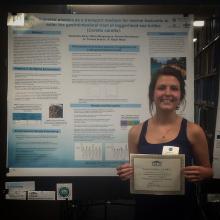I work in Dr. Seaton’s lab in the Chemistry Department. We have been studying harmful anthropogenic organic compounds, called polycyclic aromatic hydrocarbons (PAH), in loggerhead sea turtles. I’m working on my second research project in the lab. The first was investigating plastic marine debris as a source for PAHs to enter the gastrointestinal tract of loggerhead sea turtles. For this project, I spiked clean plastic with PAH concentrations mimicking those I found on actual environmental plastics, and then I added them to sea turtle GI fluids under conditions of actual digestions to look for chemical transfer. This was the first study to show that plastic is a source of exposure for sea turtles! After completing this project I just had more questions, specifically on the physiological effects of these compounds in sea turtles, so I began my second project working on quantifying the concentration of 16 different PAHs in loggerhead sea turtle blood and fat samples, and determining whether fat could be a potential PAH store in the body. The goal of my undergraduate research has been to work towards determining the physiological effects of these harmful chemicals, by first addressing potential sources, as well as establishing a baseline concentration.
I had heard that Dr. Seaton was looking for a marine biology or chemistry student who was passionate and hard working for this project and it sounded really interesting so I decided to talk to her about it. I’ve always loved marine biology and chemistry, and research is one of the most interesting aspects of science to me, but didn’t know what exactly I wanted to study. Undergraduate research was perfect for me because I was able to experience what research is like and explore a discipline and topic I would not have even considered before.
This experience has not only taught me so much about the dangers of plastics and the harmful compounds they leach to marine life, but it has also helped me figure out what field of marine biology I want to go into, and it just happens to satisfy my love for chemistry as well. Accomplishing these projects and knowing I'm participating in groundbreaking research as an undergraduate is one of the most satisfying feelings.
Through this research so far I have gained experience with grant writing, method construction, multiple extraction techniques for volatile compounds in different mediums, and GCMS and FT-IR instrument operation and data analysis. I have participated in multiple scientific meetings and conferences and have given multiple oral and poster presentations to a variety of different audiences as well. By the time I graduate I will have completed a very successful directed independent study project! I will also have the experience in scientific paper writing, defending my work to colleagues, as well as the publication process. All of these skills are will make me invaluable to any graduate school program in my field.





